Physics Student and Alumni Stories
Emily Harkness, BS Physics '20
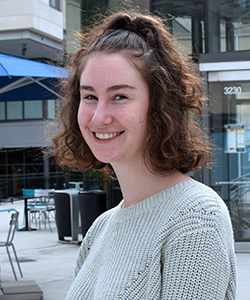
Degree: BS Physics '20
Research interests: Disease-oriented biophysics, innovations in medical physics
Co-op: Research Assistant, Drexel Department of Physics
Extracurricular activities: Drexel Treblemakers (a cappella group), Women in Physics Society, Pennoni Honors College
Awards: A.J. Drexel Scholarship, Walter R. Coley award for academic excellence in physics
Emily Harkness joined Drexel's Department of Physics on a quest to understand the universe — and encountered a community that encouraged her to explore the breadth of her degree.
Read more about Emily
James Minock, BS Physics ’20

Please tell us a little about yourself.
I am a soon to be fifth year undergraduate physics major who has been working in neutrino physics research. I study computer science for my minor, and I am also a part of Drexel’s Honors Program. Currently, I am a software developer for University of Pennsylvania’s Center for Biomedical Imaging and Computational Analysis.
Read more about James
Johannes Wagner, BS Physics ’20
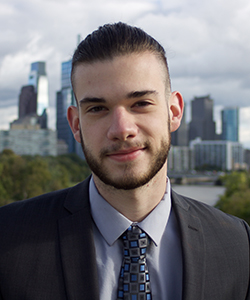
Please tell us a little about yourself.
I’m a junior physics major minoring in mathematics, computer science and data science. I’m originally from St. Pölten, Austria and came to Philadelphia in 2015. My research interests are rooted in computational particle physics. Next to physics and coding, I enjoy weightlifting and consider myself a fitness enthusiast. I also love travelling!
Read more about Johannes
Eesha Das Gupta, BS Physics '19
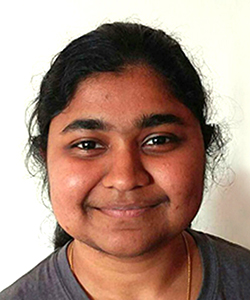
Please tell us a little about yourself.
I am currently a senior physics major here at Drexel. I'm an active member of the Drexel chapter of the Society of Physics Students (SPS), and Vice President of the Drexel Women in Physics Society (WiPS). I'm interested in computational physics research and physics outreach, and like to explore both as a part of the Drexel physics department.
Read more about Eesha
Keziah Sheldon, BS Physics '19
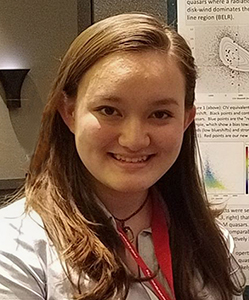
Please tell us a little about yourself.
I’m a senior physics major, I’m also a cellist, and I love coffee!
What’s your current research project? Please tell us about other research projects you were involved in.
My current research project is exploring the ICA weight space of 75,000 quasars to find possible luminosity correlations, which would be useful in constraining cosmological parameters. I’ve also been working on an archival search for existing HST quasar spectra to be used in a large scale with ground-based spectra for a further comprehensive analysis of the quasar population.
Read more about Keziah
Riley Stanford, BS Physics '19
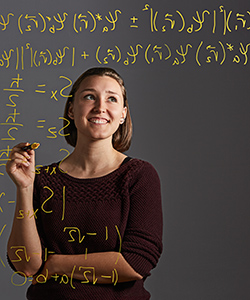
The thrill of solving complex problems — and the countless applications of her degree — have drawn Drexel University Physics junior Riley Stanford to bridge the disciplines of engineering, biophysics, chemistry, math and more, and to tackle challenges as wide ranging as threats to national defense and a mutant strain of Alzheimer’s disease.
Stanford’s first co-op was in the Weapons Control Systems department of aerospace and defense giant Lockheed Martin. The role — a systems engineering position — challenged her to write and fix code for a simulated threat to national defense using computational skills she learned in her physics courses.
Read more about Riley
Mark Giovinazzi, BS Physics '18
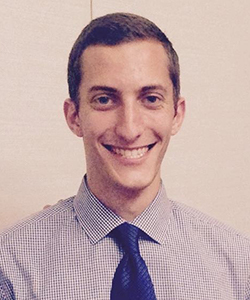
Degree: BS Physics (Astrophysics concentration) '18, Minor in Mathematics
Research Interests: Cosmology and computational astronomy, astrophysics and cosmology
Co-ops:
- Experimental Cosmology Researcher, University of Pennsylvania
- Computational Data Scientist, IceCube Neutrino Observatory
- Spectrum Systems Laboratory Technical Specialist, Lockheed Martin Advanced Technology Laboratories
Extracurricular activities: Society of Physics Students, Drexel University Circle K (service group), Pennoni Honors College, softball and football intramural teams
From conducting research for the South Pole's IceCube Neutrino Observatory to building homes through Drexel's Alternative Spring Break, Mark Giovinazzi took full advantage of his Drexel Physics degree.
Read more about Mark
Meet more Physics Undergraduate Students and Alumni
Becka Phillipson, PhD Candidate
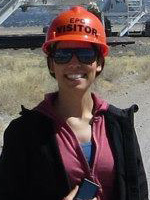
Hometown: Los Angeles, California
Research Interests: Astrophysics
Awards: John Mather Nobel Scholar (2015-2018), NASA Harriett G. Jenkins Fellow
Recent Publication: "The chaotic long-term X-ray variability of 4U 1705-44" - April 2018, MNRAS, 477, 4
Extracurricular Activities: singing in Philadelphia-based choirs, hiking, camping, weight lifting, yoga, watching baseball, video games, craft beer festivals, exploring the city!
Read more
What sparked your interest in your area of research?
I have always been interested in astronomy since an early age and ended up majoring in astronomy in college. However, it wasn't until I was working on a senior observational astronomy project that I realized I wanted to become a professional astrophysicist. For the project, we took a trip down to Apache Point Observatory in New Mexico to take our data in person on their ARC 3.5 meter telescope. I had the opportunity to look through an eyepiece on the massive telescope, and I think it was that moment, when I was able to see the Sombrero Galaxy by eye, that really sealed the deal for my future. Never have I been in such awe of our universe.
What have been the most challenging and most rewarding aspects of your research?
Coursework throughout college and graduate school certainly carries its own challenges, but it is structured, and you typically just have to crank the wheel. When it comes to research, there is a world of possibilities and all are open-ended. You are only limited by the depth of the questions you ask and your capacity to connect the dots. These skills can be difficult to cultivate, but it is extremely rewarding to try and pursue answers in the most innovative way possible. My research straddles both computational and observational astrophysics and attempts to make connections between these two vastly different approaches in studying accretion disks around black holes. My challenge is juggling double the background knowledge, but the reward is gaining inspiration from one perspective of studying these amazing objects (black holes) and applying it to the other.
Outside of physics, what are your favorite things to do around Philadelphia?
I am a member of a couple semi-professional choirs in the Philadelphia area and devote a lot of my time and energy towards musical creative outlets. There are also many venues to enjoy live music in the city! I also love training at the gym, mostly for stress relief but also to train for excursions like local 5k runs or the Spartan race, as well as yoga whenever I can. Philadelphia also has some amazing food -- there are a ton of diverse restaurants throughout the city and, as a vegan, I have a lot of options for casual or fine dining plant-based restaurants.
What is the most valuable lesson — inside or outside the classroom — you have learned at Drexel?
Something I've been developing before graduate school, but has really been put to the test lately, is responding to a challenge or difficult problem with new questions and an openness to change, rather than with a feeling of defeat. Pretty much everyone else I've met that seems to know so much more than me must have been where I'm at now. Nobody has all the answers and nobody is perfect, so the hot-shots in my field must have taken the time and energy to hit the books and figure things out despite challenges and failures. From that, I'll take inspiration.
Why would you recommend the physics department at Drexel for graduate school?
I was late in the game in deciding to come to graduate school for physics, with my undergraduate career spread thin over several years as I also worked full time in the tech industry. The physics department at Drexel, however, boasts a mature atmosphere with a solid focus on numerical techniques. In addition, many students come from diverse backgrounds in industry or other technical fields, which made me feel right at home. Not only do I feel like the atmosphere here challenges me to utilize all of my skillsets, even outside of physics, but the variety of student experiences keeps me engaged in and outside the classroom. Drexel is not a cookie-cutter machine; it is focused on producing well-rounded scientists capable of excelling in a variety of research and industry jobs.
What is the best advice that you can share with other students pursuing their graduate degree in Physics at Drexel?
Never lose your spirit of fun and try to build strong relationships with the people around you. Find things to do outside of school that can provide you stress relief and an outlet and just give yourself a life that is focused on the big picture. I have always found that reminding myself of what really matters in life, as though I'm looking back at my life from a very old age, helps me keep a sense of purpose, but also a sense of light-hearted fun in all things that I do. Let your experience here be part of your journey, rather than just a check box on a list of accomplishments.
Kelley Commeford, PhD Candidate
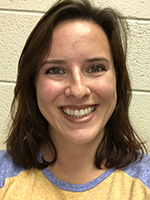
Hometown: Cripple Creek, Colorado
Research Interests: Physics Education Research (PER), specifically using social network analysis to characterize active learning environments in physics. I'm also super interested in gender biases in physics.
Awards: Honorable Mention for Drexel’s Outstanding Teaching Assistant Award
Extracurricular Activities: VP of Finance for Drexel Graduate Student Association; Previously Public Relations Officer for GSA and the Physics Graduate Student Association. Not Drexel related, but I also participate in a monthly live action role-playing (LARP) game in New Jersey.
Read more
What sparked your interest in your area of research?
I would probably say being a TA for the electricity and magnetism section as an undergraduate. The professors that I worked for did research in PER, which is how I learned about the field, and teaching for that class is how I decided I wanted to be a professor. After trying out a few other physics fields, I came back to PER because I enjoy the human element of it.
What have been the most challenging and most rewarding aspects of your research?
The most challenging aspect has definitely been getting up to speed on past research after switching into PER three years into my graduate career. The most rewarding aspect is how supportive the PER community is. Everyone is very social and supportive, which is amazing when you're a newbie and have no idea what's going on.
Describe a formative experience or moment in your graduate career.
Getting my 4.0 GPA after an undergraduate mentor told me that I wouldn't succeed in graduate school was pretty satisfying. It solidified that I DO belong in physics — I just needed research that I find engaging, which Drexel has plenty of!
What is your long-term career goal, and why?
Ideally, teaching at small college. I would like to work at an institution that puts more focus on the quality of teaching than how much money you can bring into the university. As to why — it’s because I genuinely enjoy teaching!
Outside of physics, what are your favorite things to do around Philadelphia?
I'm pretty active in our local Pokémon Go group. I also enjoy LARPing (live action role-playing — basically D&D but LIVE!).
What is the most valuable lesson — inside or outside the classroom — you have learned at Drexel?
Take time for yourself. You can't be a productive graduate student if you are a sad graduate student. Your mental health comes first.
Why would you recommend the physics department at Drexel for graduate school?
The community. Since we have steady funding sources, we don't have to be as cutthroat as other schools, and can instead work to foster an inclusive and supportive community.
What is the best advice that you can share with other students pursuing their graduate degree in physics at Drexel?
Don't be antisocial! These are the people that will get you through the next several years of your life, and will be your first professional contacts in the outside world.
Tyler Rehak, PhD Candidate
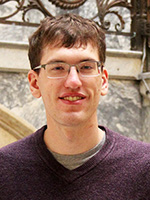
Hometown: Carol Stream, Illinois
Research Interests: Neutrino beam physics
Awards: Neutrino Physics Center Fellowship (Fermilab, 2018), Graduate College Fellowship (Drexel, 2015)
Extracurricular Activities: President of Drexel Physics Graduate Student Association (2017-18), Drexel Club Squash, Drexel Weekend Warriors, intramural sports
Read more
What is your research area?
I am currently studying astrophysics with Professor Michael Vogeley. We are looking at different physical characteristics of dwarf galaxies as a function of large-scale environment, to help discern the influence of the environment on galactic evolution.
What sparked your interest in your area of research?
I grew up 10 miles from Fermilab, the national particle physics and acceleratory laboratory. Between my junior and senior year of high school, I was lucky enough to receive an internship at Fermilab through the QuarkNet program. A tour of the lab during that internship brought me on my first trip down the MINOS elevator shaft. Ten years later, heading down the MINOS elevator to fiddle with our underground hardware still gives me a sense of wonder for what we are yet to discover. I was too late for the discoveries made with the Tevatron, but now I get to collaborate closely with Fermilab physicists on the next generation of neutrino experiments.
What have been the most challenging and most rewarding aspects of your research?
The most challenging aspect has been joining a project, learning all the background knowledge to get caught up to speed, and then realizing there's always something else I need to read more about. The most rewarding aspect is being able to contribute to scientific discussions and be seen as an equal collaborator.
Describe a formative experience or moment in your graduate career.
While visiting home for Thanksgiving during my third year, I had a meeting at Fermilab with one of the scientists I had met at a collaboration meeting earlier in the year. The meeting was a small conference room with my advisor and two Fermilab scientists, and it focused on my plans for contributing to some of the Fermilab experiments. In addition to developing my thesis topic, being in that room was the first time I felt like a true member of the physics research community.
Outside of physics, what are your favorite things to do around Philadelphia?
I've enjoyed Drexel's investment in squash by watching the annual U.S. Open and joining the club squash team. I've taken advantage of living within walking distance to one of the best art museums, and I enjoy exploring many of the city's diverse museums and historical attractions. Despite being in a major city, it's surprisingly easy to access hiking trails ranging from the Wissahickon to the Appalachian Trail.
What is the most valuable lesson — inside or outside the classroom — you have learned at Drexel?
Learning my limits and knowing when to ask for help. This is something I experienced in undergrad, too, but grad school adds unique challenges to the academic environment: teaching and helping undergraduates, fellowship and grant applications, and higher research and course expectations.
Why would you recommend the physics department at Drexel for graduate school?
There's a unique collection of graduate students in the physics department. Everyone has an interesting story of how they got to Drexel that contributes to a great community of peers. There's a large sense of collaboration and support between all the students. Drexel is also in a great location. Being close to the center of a world class city brings plenty of opportunities to take a break from work. At the same time, I'm able to live in a great residential community in West Philly.
What is the best advice that you can share with other students pursuing their graduate degree in Physics at Drexel?
Everyone admitted to graduate school deserves to be there and will go through the same struggles, so try to manage any symptoms of impostor syndrome. Take advantage of asking for help from your classmates and professors. If there's an opportunity to give a talk, present a poster or attend a conference, use it as a chance to hone your communication skills and increase your self-confidence.
Yi-Hsuan (Cindy) Lin, PhD Physics '18

What is your research area?
I am currently working in the Neutrino Particle Group of Drexel University. My collaborations EXO-200 and nEXO are looking neutrinoless double beta decay in the xenon-136 isotope, which is an extremely rare phenomenon that will give the Majorana (this means neutrino is its own antiparticle!) mass of neutrinos if observed, and set a better-than-existing limit if not observed.
Read more
What sparked your interest in this research?
Based on my undergraduate research experiences, I know my heart is set on experimental physics. The combination of in situ clean tent and data analysis work provides me a nice balance between hands-on and computational experience. In addition, being a particle physicist, I have a lot of exciting traveling opportunities to places including California, New Mexico and Scotland.
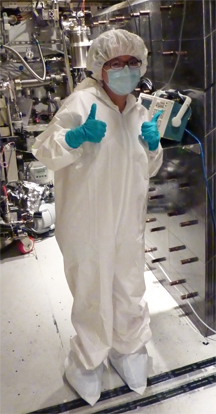
What research accomplishments are you most proud of?
I am most proud of being an NSF Graduate Research Fellow (2014-2017) and the president of our Physics Graduate Student Association.
What do you love most about being Drexel graduate student? And your department?
The thing I love the most about being a Drexel graduate student is the friendly atmosphere in the department.
What is the best advice that you can share with other students pursuing their graduate degree in physics at Drexel?
The best advice that I can share is the same as the most valuable lesson I’ve learned at Drexel: learn to schedule some time for yourself and those around you.
What is your long-term career goal and why?
When I took a year off between undergraduate and graduate school, I worked in the Princeton Plasma Physics Laboratory. The project I worked on and the people I worked with are the main motivation behind my returning to school to earn my PhD. So ultimately, I would love to continue my passion for research at a national research laboratory.
John Timlin, PhD Physics '18
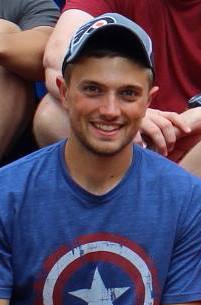
Could you tell us a little bit about yourself?
Outside of physics, I enjoy lifting weights and playing sports. While I'm not currently part of any teams, I enjoy playing basketball and roller hockey. These particular sports are high intensity and require a lot of focus to be played correctly, which can be a great stress relief. I also enjoy camping and spending days on the beach.
Read more
What is your research area?
I'm working in observational astrophysics. I am currently reducing image data and creating source catalogs from a large area survey that my adviser ran with the Spitzer Space Telescope.
What sparked your interest in this research?
My interest in astrophysics began in my senior of college when I did a research project in which I examined a supernova remnant and reconstructed the progenitor star from the ejected material. It was a lot of fun to be able to apply basic physics to dust that we observe and recreate a star.
What research accomplishments are you most proud of?
I'm most proud to be working on my current project. It's an extraordinary feeling to work on something that only a handful of people are working on but a lot of people are excited about. Also, helping to run a survey through a NASA-funded telescope is something that I'm proud of.
What have been the most challenging and most rewarding things about carrying out your research?
Everyday presents it own challenges, from understanding the physics that I'm doing and connecting it to the bigger picture, to the everyday tasks of reading and writing code and papers. To me, the most rewarding aspect of my work is using the knowledge that I have obtained over the years to solve a problem that I'm stuck on. While the feeling of being stuck is often times difficult, it is very rewarding to come up with a unique solution.
Do you have a funny story while being at Drexel that you would like to share?
There are too many to count, but I will say that I enjoy the occasional office prank and leave it at that...
What was the most valuable lesson — inside or outside the classroom — you learned at Drexel?
I think the most valuable lesson I've learned so far is the importance of hard work. Hard work has gotten me this far in my graduate career, from course work to research; learning how and when to work hard is an important lesson that everyone has to learn.
What do you love most about being Drexel graduate student? And your department?
There are a great deal of things in this department to love, but I am most fond of how well the people in the department get along. We are a very welcoming group of people and a very close-knit bunch, which holds true for the department as a whole. I am able to talk to both students and faculty very openly and comfortably, which makes discussing both work and fun easy to do.
What is the best advice that you can share with other students pursuing their graduate degree in physics at Drexel?
I think hard work is the biggest key to success, but also make sure to have fun with what you study. The professors and students are very open to helping you pursue your degree here at Drexel, and much more so if they see you're excited and enthusiastic about your work.
What is your long-term career goal and why?
I eventually would like to teach at a university and encourage students to pursue physics the way I was encouraged by my teachers and professors. While teaching is not necessarily a glamorous job, I find it to be very rewarding to be able to help others through a subject I enjoy.
Meet more Physics Graduate Students and Alumni